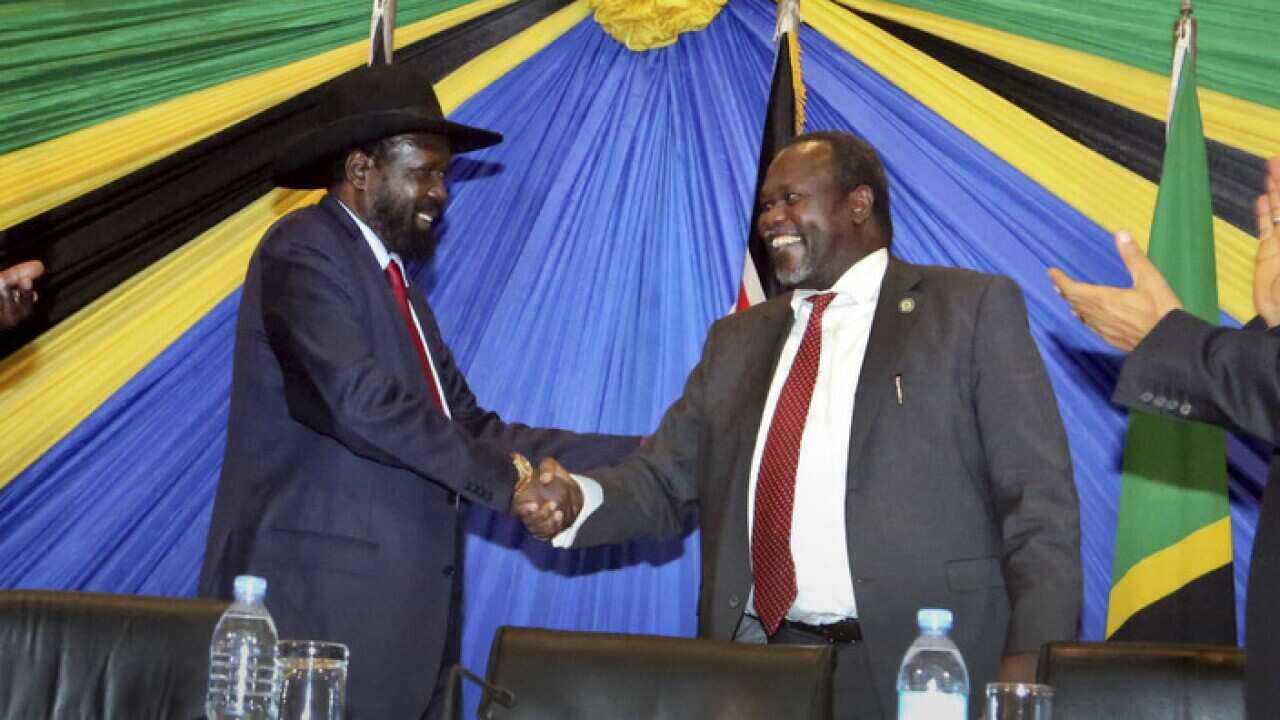(Transcript from World News Radio)
The leaders of South Sudan's warring factions have agreed to a political deal that could help to end to a 13-month-old civil war.
But supporters of the different factions are warning there's still a long way to go to achieve a settlement that will end fighting that has already cost tens-of-thousands of lives.
Darren Mara, with this report prepared by Ajak Deng Chiengkou.
(Click on tab below to hear a related item in Dinka)
The deal has been signed in Tanzania between rival factions of the ruling Sudanese People Liberation Movement, the SPLM, which led the country to independence from Sudan in 2011.
The SPLM split and fighting broke out in 2013 after President Salva Kiir accused his sacked deputy Riek Machar of attempting a coup.
Much of the killing was along ethnic lines, with fighting between the two main tribes - the Dinka, supporting Mr Kiir, and the Nuer, supporting Mr Machar.
As well as resulting in the deaths of tens-of-thousands of people, more than two-million South Sudanese have become refugees in neighbouring Ethiopia, Uganda, Kenya and Sudan.
President of Kenya, Uhuru Kenyatta, says it's time for the SPLM leaders to re-unite, and to get their supporters to stop fighting.
"It is time the guns went silent. It is time you as leaders fulfilled the mandates that the people of South Sudan expected. They expected a better life, they expect stability, they expected prosperity and development, not guns, not fear, not death."
Under the deal signed in Tanzania, representatives of the different SPLM factions have agreed to try to reunite the party.
They have also agreed to leadership will have to make a nationwide apology for atrocities committed in the past 13 months.
But it does not address the details of power-sharing, or how to reunite the South Sudanese army that has been fragmented.
Pagan Amum Okec is a former Secretary General of SPLM, and heads a group of former political detainees accused of involvement in the alleged coup attempt.
His group hasn't taken up arms in the recent fighting, and under the peace agreement he can return to his party post.
He told the Voice of America it should help longer-term peace talks in Addis Ababa, in Ethiopia.
"Reuniting the SPLM, resolving the main points of disagreement and conflict in the SPLM organization and this will pave the way for us to move to Addis Ababa and to also end the war and sign a peace agreement that will usher South Sudan into peace and into a transition toward democracy."
Dr Aduok Nyaba is a former Minister in the Government of South Sudan who represented the opposition in the talks in Tanzania.
He also told the Voice of America the Tanzania agreement should help the Addis Ababa peace talks being sponsored by the regional Intergovernmental Authority on Development, or IGAD.
"We have signed the agreement for reunification. Reunification of course came as result of the conflict that erupted in 2013. So what we have signed is an agreement for reforms. It is an irony that what has cost so many lives of people, we were able to arrive at it in just a matter of two weeks. What we have signed is a roadmap for really bringing about the reunification of SPLM and this is going to impact the IGAD-mediated peace process."
Chairman of SPLM Youth League, Akol Paul Kordit, spoke on behalf of the government delegation at the Tanzania talks.
He says it sets the framework for a final peace agreement.
"We have agreed on political issues, organizational issues and on leadership issues. All the contentious issues in the SPLM constitution shall be reviewed in the spirit of reconciliation and unification. It is not a final peace agreement but this is an agreement meant to address the root causes of the conflict that started in the SPLM. This agreement is a watershed in the history of the people of South Sudan and is a cornerstone in our search for peace."
Chief negotiator at the peace talks in Ethiopia, Nhial Deng Nhial, says he's pleased the agreement allows for the former political detainees to become more involved in seeking a settlement.
"The agreement that have been signed, at least will make it possible for the group, the former detainees to relinquish their opposition and come to becomes part and parcel of the political process."
The peace talks in Addis Ababa are expected to resume soon.
Share

